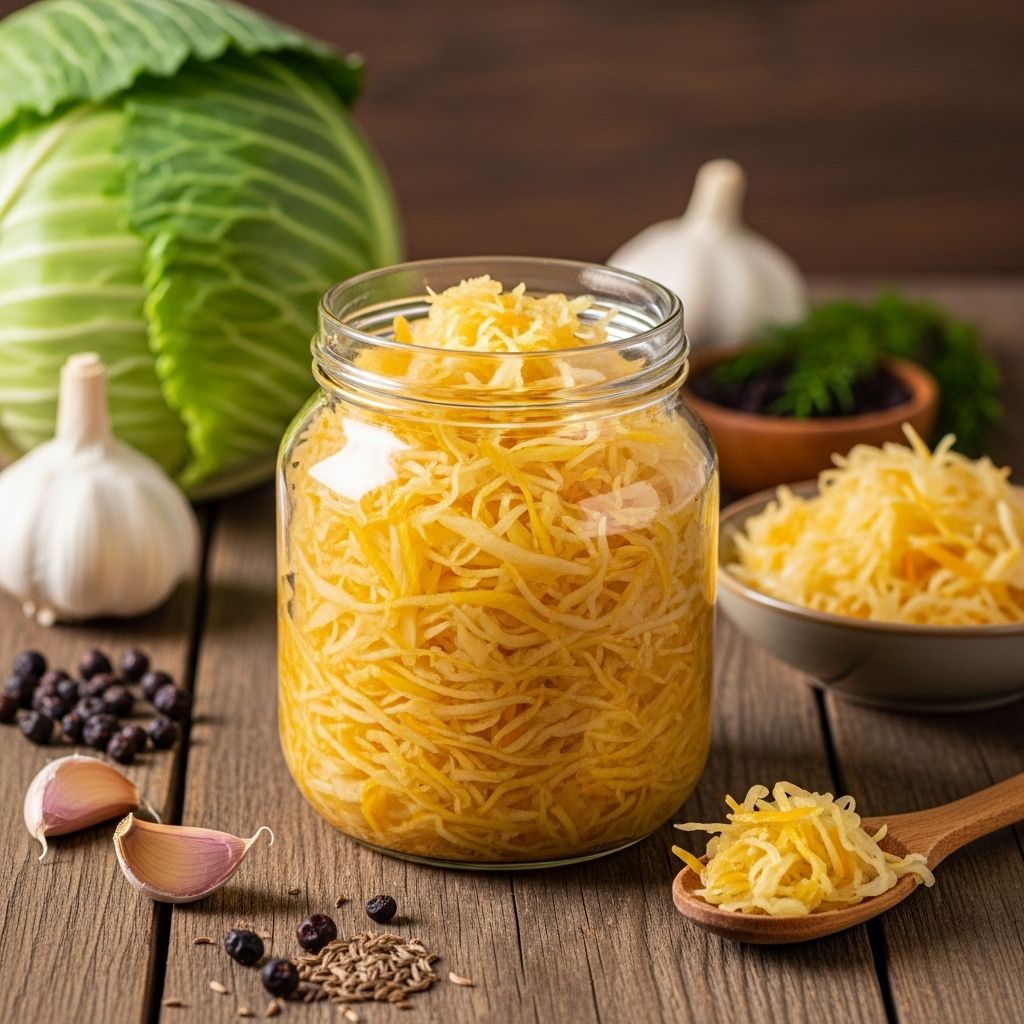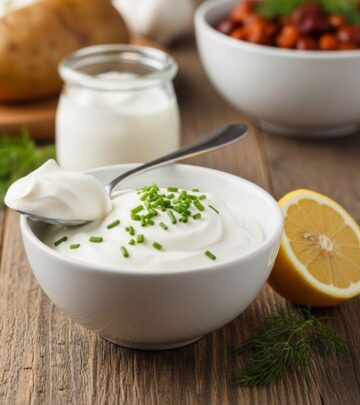12 Surprising Health Benefits of Sauerkraut: Nutrition, Uses, and Precautions
Zesty and versatile, it delivers live probiotics and antioxidants for better digestion.

Sauerkraut, a tangy fermented cabbage, is not only a popular condiment but also a nutritional powerhouse packed with probiotics, fiber, vitamins, and minerals. Originating in Eastern Europe, sauerkraut has earned widespread acclaim for its health-enhancing properties, particularly for digestive and immune health. This article dives into sauerkraut’s science-backed benefits, nutritional profile, safety guidelines, and tips for enjoying this probiotic-rich superfood.
What Is Sauerkraut?
Sauerkraut is made from shredded cabbage that is fermented by lactic acid bacteria over several weeks, resulting in a tangy snack or side dish. The fermentation process not only preserves the cabbage but also supercharges its nutrient content and creates a rich array of probiotics vital for gut health.
- Type: Fermented cabbage
- Origin: Eastern Europe
- Microorganisms: Predominantly lactic acid bacteria
Nutritional Profile of Sauerkraut
One cup (142 grams) of sauerkraut provides:
| Nutrient | Per 1 cup (142g) |
|---|---|
| Calories | 27 |
| Fat | 0.2 g |
| Carbohydrates | 6.1 g |
| Dietary Fiber | 4.1 g |
| Protein | 1.3 g |
| Sodium | ~900 mg (varies by brand) |
| Vitamin C | 21 mg (23% DV) |
| Vitamin K1 | ~13 mcg (11% DV) |
| Iron | 2.1 mg (12% DV) |
| Manganese | 0.2 mg |
| Vitamin B6 | 0.1 mg |
| Folate | ~30 mcg |
| Copper | 0.1 mg |
| Potassium | 241 mg |
In addition to the above, sauerkraut supplies calcium, magnesium, antioxidants, and a broad spectrum of B vitamins. The fermentation process also produces organic acids and enzymes, enhancing nutrient absorption.
1. Rich Source of Probiotics for Gut Health
Sauerkraut is renowned for providing beneficial probiotic bacteria—microorganisms that populate the gut, helping digest food, synthesize nutrients, and protect against pathogens. Research estimates that a single serving can contain up to 28 distinct probiotic strains, which may collectively broaden the health advantages achieved. Regular consumption can support:
- Maintenance of healthy gut flora
- Protection of intestinal cell integrity
- Defenses against toxins and harmful bacteria
- Reduction in symptoms of digestive distress, such as bloating and diarrhea
2. Enhances Digestive Health
The probiotics found in sauerkraut help balance the numbers and types of bacteria in your gut, which supports digestive function and overall well-being. Additionally, sauerkraut provides digestive enzymes created during fermentation, which help break down nutrients into more absorbable forms. This makes sauerkraut easier to digest than raw cabbage, and it’s especially beneficial for those with constipation or conditions such as IBS.
3. Boosts Immune System Function
The gut is home to approximately 70% of your immune cells. By promoting a diverse, balanced microbiome, sauerkraut may reduce inflammation, prevent the overgrowth of harmful microbes, and support immune responses. Its high levels of vitamin C and iron fuel natural antibody production and overall immune resilience, potentially reducing your risk of common infections and assisting faster recovery.
- Supports gut barrier integrity
- Alleviates allergies and reduces inflammation
- Promotes natural production of antibodies
4. Contributes to Heart Health
Regular intake of sauerkraut provides fiber, antioxidants, and micronutrients which may help regulate cholesterol, blood pressure, and inflammation, all of which benefit heart health. Vitamin K2 (produced during fermentation) is especially notable for supporting cardiovascular health by aiding calcium metabolism and reducing arterial calcification.
5. Supports Cognitive Function and Mental Well-being
A healthy gut is linked to a healthy brain via the gut-brain axis. Probiotic foods such as sauerkraut are believed to:
- Improve memory, learning, and mood
- Reduce stress, anxiety, and symptoms linked to mental fatigue
- Influence the production of neurotransmitters supporting emotional regulation
6. Supplies Powerful Antioxidants
The antioxidant content in sauerkraut (including vitamin C and compounds like glucosinolates and sulforaphane) helps fight oxidative stress in cells and tissues. These antioxidants may play a role in reducing inflammation and lowering the risk for chronic diseases, including certain cancers.
7. May Reduce Risk of Certain Cancers
Cabbage and sauerkraut contain compounds such as glucosinolates, ascorbigen, and sulforaphane. Early research suggests these may block enzymes involved in cancer development and help neutralize carcinogenic substances. More clinical studies are needed to establish their effectiveness in cancer prevention.
8. Promotes Healthy Weight Management
Sauerkraut is low in calories but high in fiber, helping you feel full longer and regulate appetite. Probiotics may also help influence metabolic rate and fat storage, supporting healthy weight maintenance over time.
- High fiber supports satiety
- Helps regulate blood sugar and cravings
9. Improves Nutrient Bioavailability
Fermentation makes vitamin C, vitamin K, B vitamins, and minerals much more bioavailable. The enzymes present in sauerkraut further aid your body in absorbing these nutrients, amplifying their impact compared to raw cabbage.
10. May Support Bone and Muscle Health
Sauerkraut contains calcium, magnesium, vitamin K2, and manganese, which are important for maintaining strong bones and muscle function. Vitamin K2 helps direct calcium to the bones, reducing the risk of arterial calcification and promoting skeletal health.
11. Can Aid in Managing Allergies and Inflammation
Probiotics and anti-inflammatory compounds in sauerkraut may calm allergic responses and inflammatory processes throughout the body, supporting overall comfort and wellness.
12. Provides a Rich, Tangy Flavor and Versatile Uses
Sauerkraut is not only healthy—it’s delicious and versatile. It’s used:
- As a condiment on sandwiches, hot dogs, and burgers
- Mixed into salads, wraps, or bowls
- Added to soups, stews, and main dishes
The fermentation process also lends a distinctive tangy kick to recipes, making sauerkraut a flavorful addition to both traditional and contemporary cuisines.
How to Choose and Store Sauerkraut
- Opt for raw, unpasteurized sauerkraut for maximum probiotic content; shelf-stable, pasteurized versions may contain fewer live bacteria.
- Look for varieties with simple ingredients: cabbage, salt, and no added sugars or preservatives.
- Store unopened sauerkraut in a cool, dark place. Refrigerate once opened.
- Consume within a month of opening for best flavor and probiotic potency.
Safety and Precautions
- High Sodium: Sauerkraut is naturally high in sodium due to the fermentation process. Consume in moderation if you are sensitive to salt or have hypertension.
- Digestive Upset: If you are not used to fermented foods, introduce sauerkraut gradually. A sudden large serving may cause bloating or gas.
- Allergies: Some brands may add spices or preservatives; always read labels if you have food allergies or intolerances.
- Pasteurization: Pasteurized sauerkraut may have fewer live probiotic strains. For full benefits, choose unpasteurized options whenever possible.
FAQs: Frequently Asked Questions About Sauerkraut
Q1: Is sauerkraut suitable for vegans and vegetarians?
Yes, sauerkraut is made entirely from plant-based ingredients (mainly cabbage and salt) and is suitable for both vegans and vegetarians.
Q2: How much sauerkraut should I eat per day for health benefits?
A tablespoon daily is often recommended to maximize probiotic and health benefits without over-consuming sodium.
Q3: Can sauerkraut help with constipation?
Yes, both its fiber and probiotic content may help alleviate constipation and support regularity.
Q4: Is there a difference between homemade and store-bought sauerkraut?
Both can offer similar benefits as long as they are unpasteurized and contain live cultures. Research indicates no significant difference in gut-protecting metabolites between homemade and store-bought versions.
Q5: Is sauerkraut safe during pregnancy?
Sauerkraut is generally safe for pregnant women and may support gut and immune health. Due to its high sodium content, moderation is advised. Always consult your doctor regarding significant dietary changes.
Delicious Ways to Enjoy Sauerkraut
- Add to salads or Buddha bowls for extra crunch.
- Top grilled sandwiches or wraps.
- Mix into mashed potatoes or roasted vegetables.
- Incorporate into scrambled eggs or omelets.
- Serve as a relish for grilled meats, tofu, or tempeh.
Conclusion
Sauerkraut stands out as a nutritional superstar, thanks to its wealth of vitamins, minerals, fiber, antioxidants, and probiotic bacteria. Eating sauerkraut regularly can support your digestive and immune systems, protect against disease, and promote whole-body wellness. For optimal benefits, choose raw, unpasteurized varieties and enjoy in moderation as part of a balanced diet.
References
- https://www.healthline.com/nutrition/benefits-of-sauerkraut
- https://www.clevelandkitchen.com/blog/why-raw-sauerkraut-is-healthier
- https://www.ucdavis.edu/food/news/gut-health-benefits-sauerkraut
- https://www.medicalnewstoday.com/articles/health-benefits-of-sauerkraut
- https://pmc.ncbi.nlm.nih.gov/articles/PMC4268643/
- https://zoe.com/learn/benefits-of-sauerkraut
- https://www.health.harvard.edu/staying-healthy/fermented-foods-can-add-depth-to-your-diet
Read full bio of medha deb













